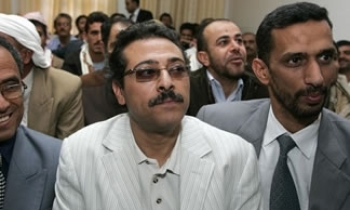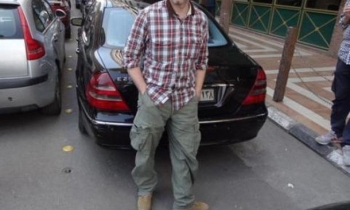The International Federation of Journalists (IFJ) has backed new calls from Sudanese and Arab world journalists for the release of Sami al-Haj, a cameraman working for Al-Jazeera, who has been held for five years, tortured and accused of terrorism offences at the notorious Guantanamo detention centre in Cuba. He has never been charged or brought to trial.

“We understand that our colleague is in poor health as a result of his inhuman treatment,” said Aidan White, IFJ General Secretary. “It is time for this ordeal to end.”
IFJ says that Sami al-Haj is being victimised for working for the Arab satellite channel Al-Jazeera. He was captured by the Pakistani Army on the Afghan border in December 2001 then handed over to United States troops before being transferred to Guantanamo in June 2002.
According to his lawyers, al-Haj was forced to confess alleged links between Al-Jazeera and the terrorist group al-Qaeda. He has undergone regular torture, has been sexually assaulted and has been subject to more than 150 interrogation sessions.
“This case represents a singular injustice that casts a shadow over journalism worldwide,” said White. “It is a shocking and shameful case that makes a mockery of American democracy.” IFJ is supporting new calls from journalists in the Sudan and around the Arab world for al-Haj’s release. IFJ is backing appeals this week from its German affiliate the Deutsche Journalistinnen- und Journalisten-Union in ver.di to German Chancellor Angela Merkel to intervene in the case.
On February 8, Reporters sans Frontières (RSF) activists, representatives of al-Jazeera, members of the Arab human rights committee and other groups demonstrated outside the Paris bureau of the Qatar-based TV to demand the release of al-Haj. Demonstrators waved pictures of the journalist, alongside slogans calling for his release. Some protestors were dressed symbolically in the orange jump suits which Guantanamo prisoners have to wear.
Sami al-Haj has been accused without proof of having interviewed Osama bin Laden and to have been involved in arms trafficking for Islamic terrorists is typical of the fate suffered by many of his fellow detainees. Al-Haj is the only confirmed journalist now imprisoned at Guantanamo.

The US alleges that he worked as a financial courier for Chechen rebels, and that he assisted al-Qaeda and extremist figures But he has been held on the basis of secret evidence; he has not been convicted or even charged with a crime. And until last year the military would not even acknowledge he was in custody.
Al-Haj’s lawyer, Clive Stafford Smith, says there is no credible evidence against him. “There is absolutely zero evidence that he has any history in terrorism at all,” he says contending that al-Haj is a political prisoner and that the focus of US questioning has not been alleged terrorist activities but obtaining intelligence on Al-Jazeera and its staff.
After a long legal battle, the US Supreme Court ruled on June 29, 2006 that special military tribunals set up to try “enemy combatants” were unconstitutional. On September 28, Congress legalised the courts and introduced amendments preventing prisoners from contesting their detention before being tried and banning all legal action against their jailors. On October 17, another law authorised the recourse to torture.
The Guantanamo camp, which was converted into a prison for “enemy combatants” on January 10, 2002, has received up to 770 prisoners. It now holds 395 and US authorities plan to put between 60 and 80 of them on trial.
The torture and ill-treatment inflicted on prisoners, which were exposed by an employee of the Marine Corps legal service, led to an internal investigation in October 2006. Making public his conclusions on February 7, 2007, Colonel Richard Bassett said there was “insufficient proof to support the accusations” of the witness.









